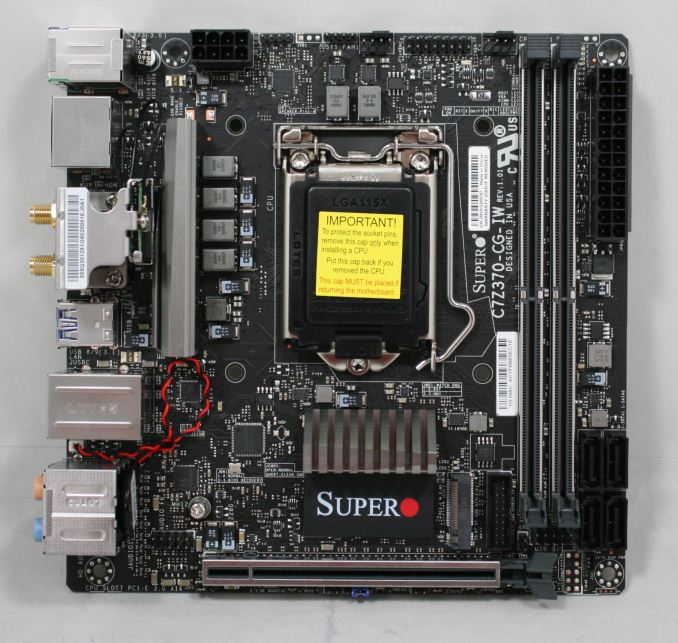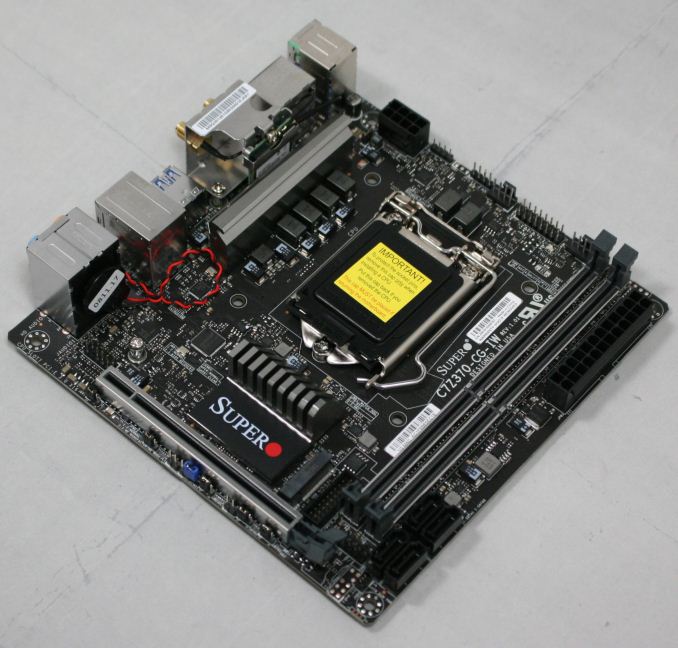The Supermicro C7Z370-CG-IW Motherboard Review: SM's First Mini-ITX Gaming Board
by Joe Shields on April 30, 2018 12:01 PM EST- Posted in
- Motherboards
- Intel
- Mini ITX
- Supermicro
- Coffee Lake
- Z370
- i7-8700K
- C7Z370
Final Words
Many SFF builds attempt to pack as much performance in to a small box as they can, while others just want an HTPC to put something up on the screen. We haven't tested the other Mini-ITX boards yet on the Z370 platform, but we know from previous experience that a Mini-ITX board can be built to offer a good base of performance and design, each separated only by their features, controllers used, and style. Truth be told, there is nothing that sticks out as a shining star here on this board, however, that isn't really a bad thing. The SuperO C7Z370-CG-IW does have nearly all the features we are to expect out of this platform, even in its tiny size. The board has dual M.2 slots for PCIe drives, four SATA ports for mass storage, supports USB 3.1 on the back panel, uses the latest Realtek ALC1220 codecs, and supports all existing Coffee Lake CPUs, including the flagship i7-8700K. In the end, the C7Z370-CG-IW is a motherboard and has the base tools needed to play games in a small form factor.
Most gaming motherboards these days has some sort of RGB LED implementation on them and the SuperO board we have is no different. In this case, a strip of RGB LEDs are on the back side of the board under the SATA ports and 24-pin ATX connector. They are able to be customized in groups through the SuperO Booster application and has a few different lighting effects as well as the ability to completely disable if that isn't preferred.
In the future, we would like to see some adjustments made to the board. First, the power limit is set to 65W which is too low. In our testing, during AVX loads (Blender, POVRay, OCCT, Prime95) we saw power limit throttling which crippled performance in those benchmarks. Raising this limit to 95W (the TDP of the i7-8700K), resolved the issue and performance is right where it should be. Another sore point was the overclocking, which was quite a let down here. The Automatic overclocking raised the voltage too high and neither profile showed better performance over stock and was worse due to current limits being hit. The same goes for manual overclocking. On other boards, 5 GHz wasn't an issue, but here we managed to reach 4.4 GHz before the current limit gets in the way. Now, this is technically Intel specification, but the concern on this board is there are no current limit options in the BIOS to bypass these limits. We reached out to Supermicro when we ran into these issues. They are looking into adding options in a new BIOS release which should add that option in future releases.
At default, our performance testing lands the C7Z370-CG-IW was right in line with the other boards we have tested so far though in some tests (Blender, POV-Ray), we experienced power limit throttling causing the scores to be well below the average. Once that option was set higher (to 95W), all power limit throttling was gone and all results were in line with the other datasets. It did manage to use a bit less power in idle states, otherwise, it was right there with the others.
Overall, the SuperO C7Z370-CG-IW is a capable board, if peak performance is not much of a concern. At a price of $191, the SuperO board is at the higher end of the range compared to the competition - given that in the past we have seen ASRock and ASUS mini-ITX boards match the bigger ones with performance and overclocking, it does not bode well for the Supermicro brand here. Most users looking at building a performance-focused small form factor system are likely to approach the top tier vendors. The strengths of the Supermicro board are when the user is not overclocking, however cheaper chipsets are available.
Update 5/2:
We have had word from Supermicro - the 65W limit seems to be a run over from the Beta BIOS the board was shipped with (1.0c, the latest online is 1.0, from 10th November). A new BIOS, version 1.1, will be available online in a couple of days to fix this issue. We have asked if this new 1.1 BIOS will have the appropriate microcode mitigations for Smeltdown.
Update 5/18:
The latest BIOS (R1.1), has been confirmed to have the proper 95W power limit at default settings. This change prevents premature throttling during heavy loads at stock settings. We have also confirmed this BIOS does include the appropriate microcode mitigations for Smeltdown.
Other AnandTech Z370 Motherboard Reviews:
- The Anandtech Coffee Lake Review: Initial Numbers on the Core i7-8700K and Core i5-8400
- Analyzing Z370 for Intel's 8th Generation Coffee Lake: A Quick Look at 50+ Motherboards
- ($250) The NZXT N7 Z370 Review [LINK]
- ($191) The SuperO C7Z370-CG-IW Review [this review]
- ($150) The GIGABYTE Z370 Ultra Gaming Review [planned]
- ($144) The GIGABYTE Z370 Gaming WiFi Review [planned]
- ($397) The ASUS ROG Maximus X Apex Review [planned]
- ($180) The ASUS Z370-I Gaming [planned]












31 Comments
View All Comments
Srikzquest - Monday, April 30, 2018 - link
Hi Joe, How is the Realtek Wifi card compared to Intel? And How many onboard USB Headers are available? and which versions are available, I see you mentioned USB 3.0 but are there others? Thank you...Srikzquest - Monday, April 30, 2018 - link
Sorry, read it again and I see there are 2 USB 3.0 and 2 USB 2.0 onboard headers available. I still would like to know more about the Realtek Wifi Card though, I haven't see any itx boards with that so far.MrCommunistGen - Monday, April 30, 2018 - link
On page 4 of the review under "Board Features" the card is listed as:1 x Realtek TRL9922BE Wi-Fi ac 2T/2R
I don't have any direct experience with this model, but I have used their previous generation RTL-8821AE which is a 1T1R wireless-AC card. It came with a mini-ITX H97 board I bought for home theater use.
For Wi-Fi only duties the card performs fine, but the link rate is limited to 433Mbps due to the single stream nature of the card. With good signal I got almost exactly half the sustained transfer rates as with a 2 stream Intel 7260 or with the 2 stream Broadcom BCM94352. So in that regard performance seemed to be pretty good, matching what was expected based on the specs.
That said, I definitely saw some strange behavior when I tried to use Wi-Fi and Bluetooth simultaneously (playing audio to a BT speaker while watching streaming video online). Either the audio would have frequent dropouts OR the data stream would be interrupted, causing buffering.
My guess would be that, despite having both 2.4GHz and 5GHz capability, they only had 1 full transmit/receive chain and that the radio was having to cycle back and forth between the two to maintain both the wireless AC and Bluetooth. I worked around it by using a USB Bluetooth dongle I had on-hand until I was able to replace the card.
Hopefully Realtek has addressed this with the newer model.
ianmills - Monday, April 30, 2018 - link
There is interference between USB 3.0 and 2.4ghz wifi. As far as I know there is no solution other than moving the 2 as far apart as possible. Intel has a page about it here https://www.intel.com/content/www/us/en/io/univers...MrCommunistGen - Monday, April 30, 2018 - link
Thanks, but:1. I was using 5GHz WiFi
2. The card is mini-PCI-E, not USB.
Yeah, the Bluetooth is probably connected over USB, but I've tested both the Intel 7260AC and Broadcom BCM94352, and neither of those has issues streaming video while also doing Bluetooth audio.
Srikzquest - Tuesday, May 1, 2018 - link
I did further reading and looks like this particular card has MU-MIMO capability, may be that will help with the transmit/receive pipeline.Hakaslak - Tuesday, May 1, 2018 - link
Anything stopping us from pulling out the Realtek Wifi card and putting in a card with the same interface, i.e. mPCIe Intel 8260, or a M.2 2230 9260NGW?DanNeely - Monday, April 30, 2018 - link
As limited as this boards power distribution appears to be I'm not convinced lifting the current limits is a good idea.Roen - Monday, April 30, 2018 - link
The power distribution is better than the Asus, even though it has less phases, it can handle more juice.Srikzquest - Monday, April 30, 2018 - link
It has all the features compared to other flagship boards except for Thunderbolt port I believe which if I am correct not many people use or need but other boards also do have their share of omissions.1. Asus ROG Strix Z370 I (No HDMI 2.0, No rear USB 3.1 ports, only Header available)
2. Asrock Fatality Z370 I (No USB 3.1 Ports)
3. Gigabyte Z370N Wifi (No USB 3.1 Ports)
4. MSI Z370I GAMING PRO CARBON AC (No HDMI 2.0)